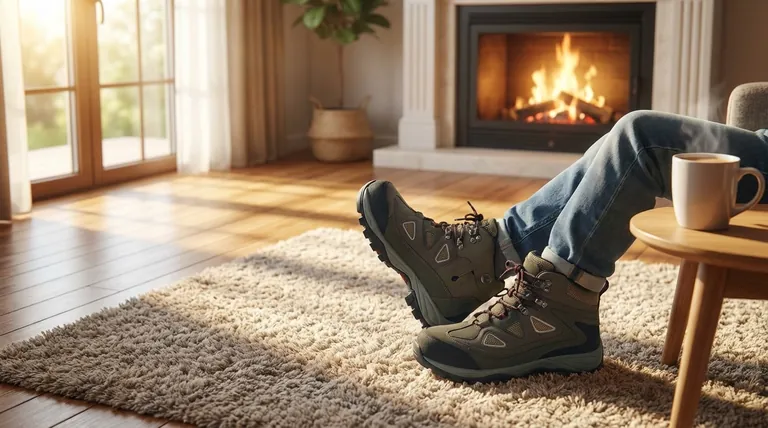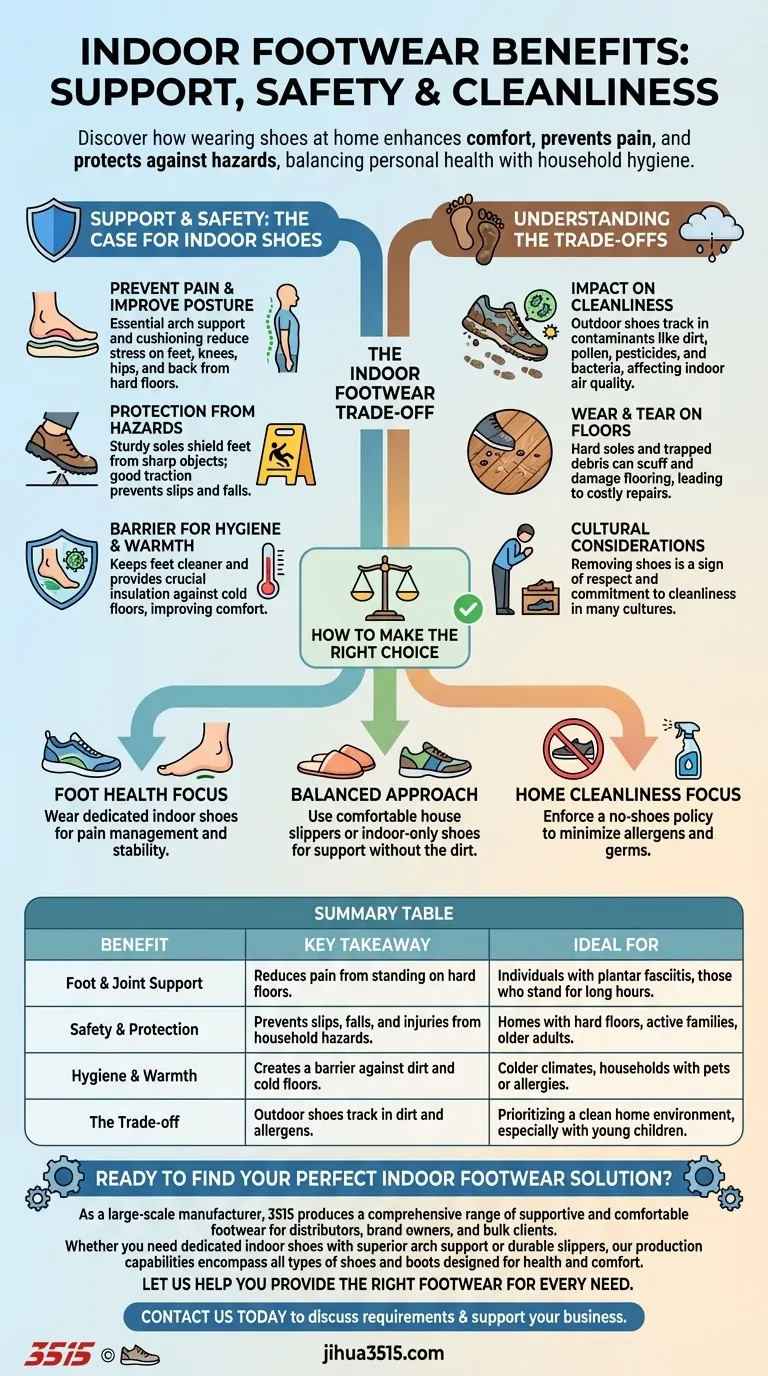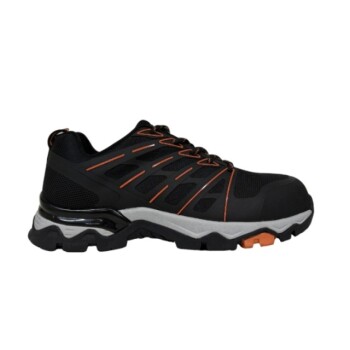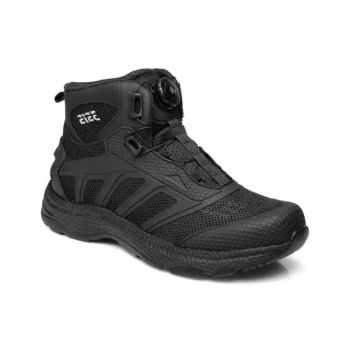The primary benefits of wearing shoes at home are improved foot support, protection from household hazards, better foot hygiene, and warmth. For individuals with specific foot conditions like plantar fasciitis or those who spend significant time standing on hard surfaces, proper indoor footwear can significantly enhance comfort and prevent pain.
The decision to wear shoes indoors involves a fundamental trade-off. You are often choosing between the direct benefits of personal foot support and safety versus the indirect benefits of maintaining a cleaner, contaminant-free home environment.

The Case for Indoor Footwear: Support and Safety
Preventing Foot and Joint Pain
Shoes with proper arch support and cushioning are essential for preventing common foot ailments, especially for those who stand or walk on hard floors like tile or wood for extended periods.
Supportive footwear helps absorb the impact of each step, which reduces stress not only on your feet but also on your knees, hips, and back. This can lead to improved posture and an overall reduction in chronic pain.
Protection from Household Hazards
A sturdy sole protects your feet from stepping on sharp objects, spills, or dropped items. It also minimizes the risk of painful injuries from stubbing your toes on furniture.
For homes with smooth or potentially slick surfaces, shoes with good traction can be a simple and effective tool to prevent slips and falls.
A Barrier for Hygiene and Warmth
Footwear creates a physical barrier between your skin and any floor-level dirt, pet hair, dust, or allergens. This helps keep your feet cleaner throughout the day.
In colder climates or for individuals with conditions like arthritis, shoes provide crucial insulation against cold floors, improving comfort and circulation.
Understanding the Trade-offs: What You Track Inside
The Impact on Household Cleanliness
Shoes that have been worn outside invariably track in outdoor contaminants such as dirt, pollen, pesticides, and bacteria. This can directly impact your home's cleanliness and indoor air quality.
These tracked-in particles can be a particular concern for households with young children or pets who have frequent contact with the floor. They can also trigger symptoms for those with allergies or asthma.
Wear and Tear on Your Floors
The hard soles and trapped debris on outdoor shoes can cause scuffs, scratches, and accelerated wear on certain types of flooring, especially hardwood. Over time, this can lead to the need for costly repairs or premature replacement.
Cultural and Social Considerations
In many cultures, removing shoes before entering a home is a fundamental sign of respect and a commitment to cleanliness. Being mindful of this norm is important when hosting guests or visiting others.
How to Make the Right Choice
The most effective solution for many is a compromise: using a pair of supportive slippers or dedicated "indoor-only" shoes that are never worn outside. This approach provides the benefits of foot support without introducing external contaminants.
- If your primary focus is foot health: Wear supportive, dedicated indoor shoes to manage pain and provide stability, especially if you have a condition like plantar fasciitis or stand for long hours.
- If your primary focus is home cleanliness: Enforce a strict no-shoes policy to minimize allergens and germs, which is especially important if you have young children or suffer from allergies.
- If your primary focus is a balanced approach: Use comfortable house slippers or dedicated indoor shoes to get the benefits of support and warmth without the dirt.
Ultimately, the best practice is the one that consciously aligns with your personal health needs and household priorities.
Summary Table:
| Benefit | Key Takeaway | Ideal For |
|---|---|---|
| Foot & Joint Support | Reduces pain from standing on hard floors. | Individuals with plantar fasciitis, those who stand for long hours. |
| Safety & Protection | Prevents slips, falls, and injuries from household hazards. | Homes with hard floors, active families, older adults. |
| Hygiene & Warmth | Creates a barrier against dirt and cold floors. | Colder climates, households with pets or allergies. |
| The Trade-off | Outdoor shoes track in dirt and allergens. | Prioritizing a clean home environment, especially with young children. |
Ready to Find Your Perfect Indoor Footwear Solution?
As a large-scale manufacturer, 3515 produces a comprehensive range of supportive and comfortable footwear for distributors, brand owners, and bulk clients. Whether you need dedicated indoor shoes with superior arch support or durable slippers for your customers, our production capabilities encompass all types of shoes and boots designed for health and comfort.
Let us help you provide the right footwear for every need.
Contact us today to discuss your requirements and discover how we can support your business.
Visual Guide

Related Products
- Safety Footwear Wholesale Manufacturer for Custom OEM/ODM Production
- Premium KPU Injection Athletic Style Safety Shoes
- Wholesale Leather Safety Boots with Customizable Protective Toe
- Wholesale Safety Footwear Manufacturer for Bulk & Custom OEM Orders
- Customizable Anti-Smash Safety Boots for Wholesale & Private Label Manufacturing
People Also Ask
- Do snake bite boots work? Your Ultimate Guide to Effective Snake Bite Protection
- What cultural and environmental considerations are tied to wearing shoes indoors? Balance Hygiene, Tradition, and Foot Health
- Is safety-toe as good as steel toe? Choose the Right Protection for Your Job
- How long can you wear safety boots? The Lifespan is Determined by Wear, Not Time
- What are OSHA approved shoes? Understanding the Correct Standards for Workplace Safety



















